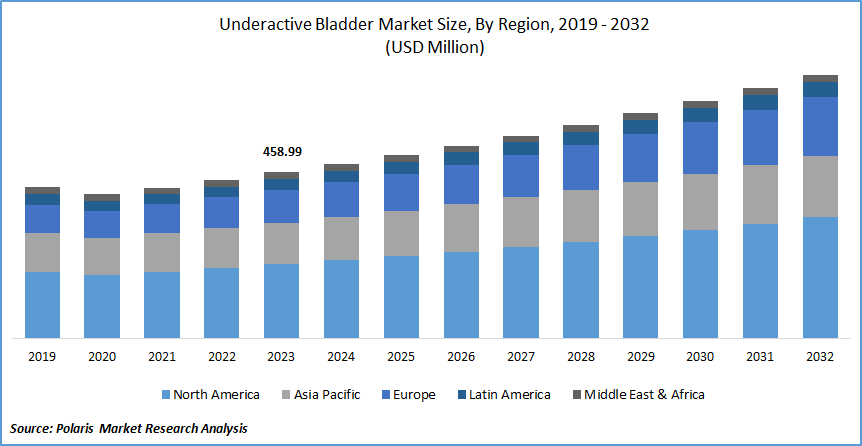
Underactive Bladder Market Share, Size, Trends, Industry Analysis Report, By Treatment Type (Pharmacotherapy, Surgical Methods, Urethral Assist Device, Stem Cell and Gene Therapies); By Route of Administration; By End User; By Distribution Channel; By Region; Segment Forecast, 2024 - 2032
- Published Date:Feb-2024
- Pages: 115
- Format: PDF
- Report ID: PM4255
- Base Year: 2023
- Historical Data: 2019-2022
Report Outlook
The global underactive bladder market size and share was valued at USD 458.99 million in 2023 and is expected to grow at a CAGR of 5.3% during the forecast period.
An underactive bladder is a condition where the bladder experiences reduced strength and duration of contraction, resulting in prolonged bladder emptying or inability to empty the bladder within a normal period.
The global underactive bladder market is anticipated to grow significantly in the coming years due to several factors, such as the increasing geriatric population. As people age, the muscles in the bladder become weaker, leading to a decrease in bladder function and an increase in the likelihood of underactive bladders. With the number of people aged 65 and older projected to reach nearly 2 Million by 2050, the demand for effective treatments and products that can help manage this condition is expected to rise. Advances in medical technology have also played a crucial role in the growth of the underactive bladder market. New medications, surgical procedures, and non-invasive devices have been developed to improve bladder function and alleviate symptoms associated with underactive bladders. These technological advancements have made it easier for patients to access effective treatments, further fueling market growth.

To Understand More About this Research: Request a Free Sample Report
However, the market is hindered by the high cost of some treatments. Advanced treatments like sacral neuromodulation therapy or urethral bulking agents could be expensive, making them inaccessible to some patients. In addition, the cost of these treatments discourages some patients from seeking treatment altogether.
The underactive bladder market report details key market dynamics to help industry players align their business strategies with current and future trends. It examines technological advances and breakthroughs in the industry and their impact on the market presence. Furthermore, a detailed regional analysis of the industry at the local, national, and global levels has been provided.
Growth Drivers
Increasing prevalence of urinary incontinence
Urinary incontinence, which affects millions of people worldwide, is the loss of bladder control, resulting in involuntary leakage of urine. This condition can be caused by various factors such as age, obesity, childbirth, and neurological disorders. As the global population ages, the prevalence of urinary incontinence is expected to increase, leading to a growing demand for effective treatments.
Underactive bladder, also known as detrusor underactivity, is a type of urinary incontinence that occurs when the muscles in the bladder wall are weakened, reducing the ability to contract and release urine effectively. The rising incidence of urinary incontinence has created a need for alternative treatment options, including drugs, devices, and surgery, driving the growth of the underactive bladder market. As a result, the increasing prevalence of urinary incontinence drives market growth.

Report Segmentation
The market is primarily segmented based on treatment type, route of administration, end-user, distribution channel, and region.
|
By Treatment Type |
By Route of Administration |
By End User |
By Distribution Channel |
By Region |
|
|
|
|
|
To Understand the Scope of this Report: Speak to Analyst
By Treatment Type Analysis
The urethral assist devices held the dominating revenue share in 2023.
The urethral assist device held the dominant revenue share in the underactive bladder market in 2023 due to its ability to effectively treat urinary retention and Benign Prostatic Hyperplasia (BPH). These devices are designed to support the urethra and help improve urine flow, reducing the symptoms of an underactive bladder. They are particularly useful for patients who have difficulty urinating or experience frequent urination, which are common symptoms of underactive bladders. Additionally, urethral assist devices are minimally invasive and can be easily inserted and removed, making them a preferred choice among patients and healthcare providers.
By End User Analysis
Hospitals segment dominated the global market in 2023.
The hospital segment dominated the global underactive bladder market in 2023 owing to several factors. Hospitals are the primary healthcare grounds where patients with urinary retention or other bladder disorders are typically diagnosed and treated. Hospitals have well-equipped facilities and trained healthcare professionals who can provide advanced treatments such as sacral neuromodulation therapy, which is a minimally invasive procedure that requires specialized equipment and expertise.
Along with this, many hospitals have dedicated urology departments that offer comprehensive care for bladder disorders, including surgical interventions and postoperative care. Hospitals often participate in clinical trials and research studies, which helps them stay up-to-date with the latest advancements in underactive bladder treatment technologies.

Regional Insights
North America region dominated the global market in 2023.
The North American region, which includes the United States and Canada, dominated the market in 2023 because of several factors, including a large aging population, a high prevalence of urinary incontinence, and increased awareness about the condition and available treatments. In addition, the presence of advanced healthcare infrastructure, well-established reimbursement policies, and a strong presence of key players in the region have contributed to the growth of the underactive bladder market in North America. Also, the increasing adoption of non-invasive and minimally invasive procedures, such as neuromodulation therapy and pelvic floor exercises, has fueled the demand for underactive bladder treatments in this region.
The European region is expected to experience significant growth in the market due to the increasing prevalence of urinary incontinence and overactive bladder symptoms among the senior population in countries such as Germany, France, the UK, and Italy, which is driving the demand for effective treatments, including underactive bladder therapies. Also, the rising awareness about the importance of early diagnosis and treatment of urinary disorders, associated with the growing availability of minimally invasive procedures, is propelling the adoption of underactive bladder treatments in the region.

Key Market Players & Competitive Insights
The treatment of underactive bladder (UAB) is a significant concern for many individuals, and several companies are actively involved in developing and providing solutions to address this issue. Pharmaceutical companies such as Pfizer, ASTELLAS PHARMA, and Dr Reddy’s Lab are engaged in the development of drugs that can help treat UAB symptoms, including urgency, frequency, and incontinence. In addition, healthcare providers and hospitals are offering various therapies and surgeries to treat UAB, including behavioral therapy, physical therapy, and surgery to repair or replace damaged nerves or muscles.
Some of the major players operating in the global market include:
- ASTELLAS PHARMA GLOBAL DEVELOPMENT, INC.
- Axonics, Inc.
- Boehringer Ingelheim International GmbH
- Cipla Inc.
- Dr Reddy’s Laboratories Ltd
- Novartis AG
- ONO PHARMACEUTICAL CO., LTD.
- Orion Corporation
- Pfizer Inc.
- Vesiflo
Recent Developments
- In July 2022, Dr. Reddy’s Laboratories Ltd., a pharmaceutical company based in India that specializes in the development, manufacture, and sale of generic drugs, launched Fesoterodine Fumarate extended-release tablets, a therapeutic generic medication in the United States market after receiving approval from the U.S. Food and Drug Administration (USFDA).
Underactive Bladder Market Report Scope
|
Report Attributes |
Details |
|
Market size value in 2024 |
USD 482.03 Million |
|
Revenue Forecast in 2032 |
USD 728.06 Million |
|
CAGR |
5.3% from 2024 – 2032 |
|
Base year |
2023 |
|
Historical data |
2019 – 2022 |
|
Forecast period |
2024 – 2032 |
|
Quantitative units |
Revenue in USD Million and CAGR from 2024 to 2032 |
|
Segments Covered |
By Treatment Type, By Route of Administration, By End User, By Distribution Channel, By Region |
|
Regional scope |
North America, Europe, Asia Pacific, Latin America; Middle East & Africa |
|
Customization |
Report customization as per your requirements concerning countries, regions, and segmentation. |
Delve into the intricacies of the underactive bladder in 2024 through the meticulously compiled market share, size, and revenue growth rate statistics by Polaris Market Research Industry Reports. Uncover a comprehensive analysis that not only projects market trends up to 2032 but also provides valuable insights into the historical landscape. Immerse yourself in the depth of this industry analysis by acquiring a complimentary PDF download of the sample report.
FAQ's
The Underactive Bladder Market report covering key segments are treatment type, route of administration, end user, distribution channel, and region.
The global underactive bladder market size is expected to reach USD 728.06 Million by 2032
The global underactive bladder market is expected to grow at a CAGR of 5.3% during the forecast period
North America regions is leading the global market.
Increasing prevalence of urinary incontinence are the key driving factors in Underactive Bladder Market.
